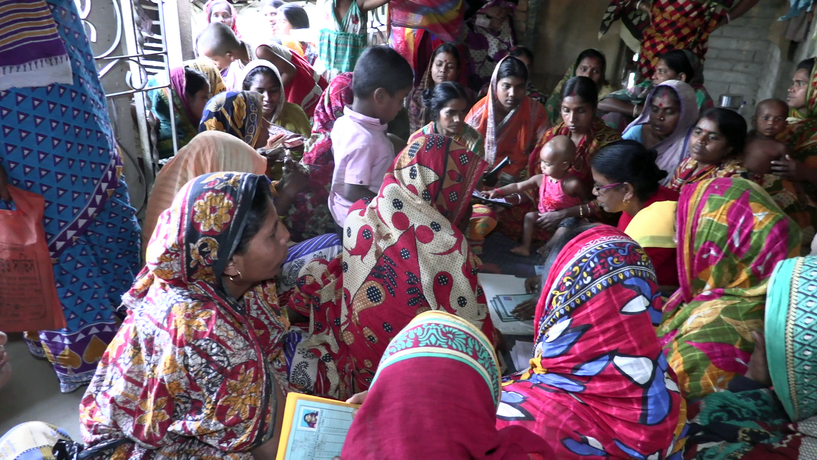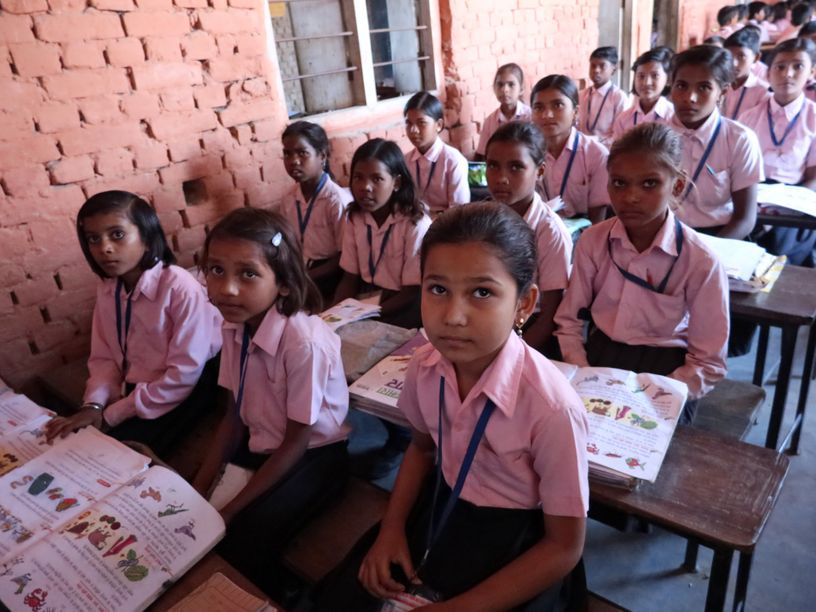STANDARD OF LIVING AND MICRO-CREDIT
In addition to promoting education and health, we set up a micro-credit programme in early 2010 aimed at helping the families of our most disadvantaged pupils. Thanks to grants and subsidies, more than 20,000 small loans were granted to the mothers of these pupils. In addition to targeting the poor, by helping them escape poverty with small loans that enable them to start their own micro-enterprises, this programme also helps to finance their children's education.
Operationally self-financing
All the interest collected is used to finance the schools' operating budget. In 2018, it will cover nearly 30% of our total expenses. Given the steady decline in donations over the years, this programme, in addition to contributing to the emancipation of women, is gradually leading to our goal of self-subsistence.
Self-financing is our main aim because it is the only way to sustain our educational and medical programmes. If we are to achieve this target, then we need to inject additional funds and provide loans to more mothers, which is the best way to continue and strengthen our efforts.
Project in brief
Following community micro-credit experiments in Bihar in approximately 15 villages, the project took on a new dimension under the aegis of Dr Pradip Har and Martial Salamolard at the end of 2009. Their approach is based on the authorised Grameen Bank system. The loan conditions are as follows:
- The loan term is 10 months or 40 weeks with weekly repayments; the loans are granted to mothers only, starting with those of the Ecoles de la Terre pupils.
- The loan amount is fixed and amounts today to 7,500 Indian rupees. The weekly repayment is set at 210 INR, including interest, to take into account the mothers' financial standing. The women are organised into groups of five members who are jointly and severally liable for the repayment of all loans.
- The interest generated, i.e. 900 rupees representing 12% of the loan, is used entirely to cover the operating costs of the Ecoles de la Terre apprenticeship centres.
Loan procedure
The strict and rigorous procedure for selection of the mothers explains in large part the success of the programme. It includes the following steps:
- We choose a homogeneous region over a distance of 2 km to 3 km, visit the inhabitants and talk to them openly, starting with the mothers.
- We select the candidates, explain the essential rules of the programme and emphasise that they will be in groups of five women and the shared responsibility that this entails. We invite 100 women to attend the first meeting.
- We ask the women to organise themselves into groups of five based on whether they are neighbours, already know each other and can work together. We explain the rules of the programme again.
- We meet each woman individually the next day and arrange for them to meet their groups. We invite them to explain the type of activities they wish to undertake with a loan and assess the revenue that could be generated by each activity.
- We check that candidates from different families do not live more than five minutes away from each other; ensure that at least three members of the group can read and write, and that all have decided to start a micro-activity voluntarily.
- We visit the candidates' families after one week to assess their standard of living and local reputation, and monitor their financial background.
- We organise interim meetings one week after the assessment stage by convening a maximum of three groups (15 women) per meeting in order to check the above criteria once again. We explain the rules in detail again, and decide where the loans will be handed out and repayments made. At that point, the women start to fill out their loan application forms.
- We set up another meeting to check that all the rules are understood by all the candidates, and check their identity documents and loan application forms.
- We organise an aptitude test to assess the candidates' financial situation, their level of education and business skills within a week. One week after this test, the groups complete the loan formalities.
Les résultats du programme
After eight years in operation, 20,000 women have benefited from these small loans, primarily the mothers of the pupils attending our schools, who are mainly the poorest and most deprived. More often than not, these mothers are alone, divorced or abandoned. And even if their husbands are working, these mothers must generate additional income to ensure their families are properly fed. At a micro-level, if we take a loan of CHF 100 invested at the beginning of 2010, when we launched our programme, thanks to the renewal policy, no fewer than 10 loans of this amount will have been distributed to needy mothers of families, enabling them to:
- send their children to school and ensure their development by guaranteeing them sufficient high quality food, which is essential for improved health
- raise their social status within their families and communities
- allocate all the interest generated to the running of local schools
- boost rural and semi-urban areas by putting money into circulation and thus helping villagers to provide the local economy with a cash injection, a vital step in moving forward
We have launched our micro-credit initiative in some of India's poorest regions, including Bihar, the Sundarbans islands of West Bengal and the Thar Desert of Rajasthan, three states some 3,000 km apart.
The best evidence of the programme's success is that all the loans and interest have been fully repaid at maturity, something very rare on a scale such as this and over a period of more than eight years. This is the result of a careful selection and training procedure for candidates, as well as close monitoring and effective follow-up. Our activities are also supported by the expert advice provided by the company Creditwatch. Moreover, the motivation of the mothers to repay without default is undoubtedly due to the fact that all the interest they pay is used to finance their children's education.
Impact on women
Granting a loan to a mother means giving her the opportunity to raise her social status within her family and local community. As part of the loan-granting process, she is interviewed and has to pass sometimes difficult tests and achieve good results. As the income generated by self-employment increases, she earns the respect of her husband and children. Given her initial status, this boosts her confidence and makes her more resilient.
The additional income she generates covers part of the school expenses and facilitates access to schools for her children, without forcing them to work outside their homes in factories or in the fields.
Becoming a member of a group of five women has very positive repercussions. The mother becomes the partner of a group of clients who have a vested interest in their success and guarantee the full repayment of the loans. This results in each woman helping each other with technical, accounting and other advice. Another important factor is the moral and emotional support that these women can provide to each other.
If the mother has a daughter, she becomes a role model, instead of being discredited by her family as is still all too often the case. The Ecole de la Terre project has already created several apprenticeship centres that give candidates training in different fields, such as computer science, handicraft manufacture, weaving, sewing, embroidery, design, etc. As a result, many young women have the opportunity to obtain paid employment or become self-employed through the micro-credit programme..

Impact on education
As we have already noted, making primary education widespread was one of the long-term priorities of the Indian government, but this is still far from being achieved, especially in rural areas. Ecole de la Terre has set up several dozen schools and apprenticeship centres in the three rural Indian states of Bihar, West Bengal and Rajasthan, as well as in the slums of Calcutta and Delhi. Thousands of girls and boys attend our schools in these areas where state schools are either non-existent or sub-standard.
Despite these results, the Indian government has constantly delayed grants for the financing of the operating costs of our schools. One obvious reason is the success of the 'Income for Education' programme; the monthly interest collected from each client covers a substantial part of the operating costs of schools, apprenticeship centres and health clinics. This contribution represents nearly 30% of Ecoles de la Terre's operating budget.
The operating costs of schools are high; they include teachers' salaries, school maintenance, books and school supplies, uniforms, snacks, etc. This is why the income generated by self-employed mothers is vital, not only for the mothers themselves but also for Ecoles de la Terre.

The successes
In addition to creating additional revenue for the mothers, providing families with the opportunity to send their children – particularly girls – to school, vocational training and raising the social status of mothers and daughters, this programme has other benefits.
From a micro-economic perspective, the added value of the money in circulation generated by entrepreneurial activities carried out by mothers leads to an increase in the money supply needed to purchase goods and services in rural and suburban areas. This 'income for education' tandem is the driving force behind our efforts, which creates a multiplier effect.
When we look at the unprecedented success of our project, on such a huge scale and over such a long period of time, it becomes clear that it must be developed further. At this particular point in time, we have gathered all the required components for the success of such an action plan.
This multiplier effect is equal to promoting the education of the most disadvantaged individuals, guaranteeing the financing of schools by our own means, and raising the standard of living of poor families by offering them the necessary self-management tools, so they can escape the pitfalls of dependency and reliance on charity.


